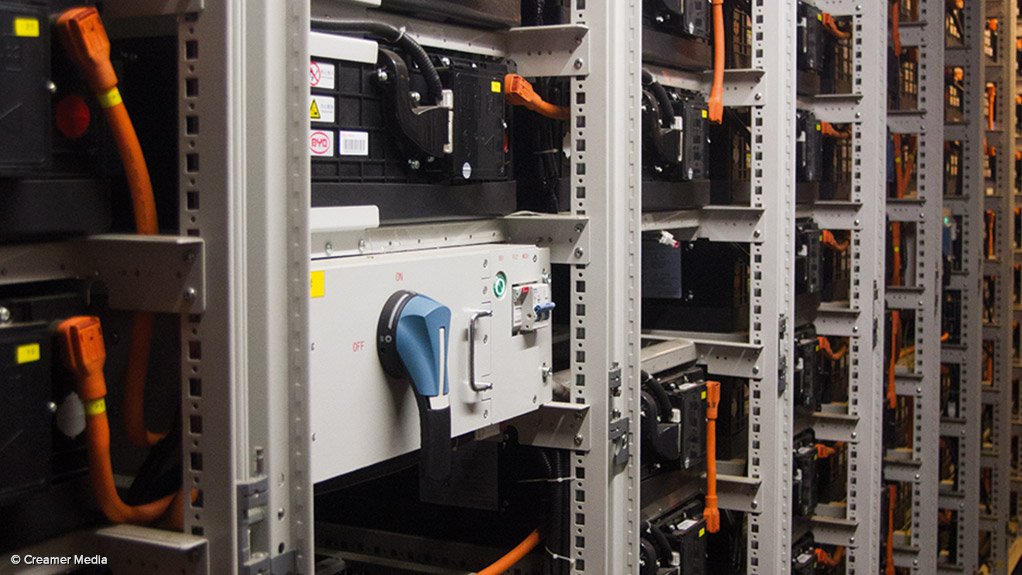Grid storage uptake in South Africa lacks ‘direction or momentum’
A new report published by the International Institute for Sustainable Development (IISD) highlights that grid storage has yet to gain “direction or momentum” in South Africa, despite a growing recognition of the role that both utility scale battery energy storage systems (BESS) and other storage technologies can play in providing electricity services besides that of complementing renewables.
Titled ‘Watts in Store’, the report distinguishes between grid or front-of-the-meter storage and consumer storage, with behind-the-meter energy storage having expanded significantly as firms and households have sought to protect themselves from intensifying loadshedding. Industry estimates quoted in the report indicate that, by 2022, yearly residential storage deployments alone had jumped to about 2 GWh.
By contrast, the deployment of grid storage, including BESS and new pumped hydro schemes, has been slow and is even lagging the roll-out tempo envisaged in the Integrated Resource Plan of 2019.
“While BESS is included as required new capacity in national energy plans, South Africa does not have a national energy storage strategy or roadmap, nor does it appear that one is being developed,” IISD’s Richard Halsey states.
He notes that the Tubatse pumped hydro scheme has been on hold for over a decade, while the first 513 MW of energy storage in the IRP 2019 was meant to come online in 2022, but the tender was only published in March 2023.
The Department of Mineral Resources and Energy also announced recently that the bid submission date for the tender had been postponed from July 7 to August 2 to accommodate delays relating to securing grid connection letters from Eskom.
The first phase of Eskom’s BESS roll-out had also been extended by six months past the June 2023 deadline, while several of the renewables-battery projects associated with the much-delayed risk mitigation procurement programme of 2020 had not yet reached financial close.
“Grid storage is certainly not a silver bullet for the electricity crisis nor a stand-alone solution for loadshedding.
“However, as it can assist on multiple fronts, it is surprising that grid storage has received relatively little attention in mainstream discussions on combatting the electricity crisis in South Africa,” the report states.
Halsey says the report, which is to be followed by a second document that will focus on how best to deploy grid storage, also helps to show the “multiple ways energy storage can benefit the power system in South Africa”.
“Narratives that focus only on the role of energy storage to address the variability of renewable energy undermine the overall value energy storage can add to the power system.
“Furthermore, because South Africa still has a low penetration of renewable energy, such narratives could lead to the interpretation that energy storage is not a priority now.”
City Power’s Paul Vermeulen amplifies this point, arguing that the business case for the roll-out of BESS at a municipal level is already strong and will continue to improve as costs fall in future.
He notes that at several of City Power’s 40 intake points in Johannesburg, the stations are operating close to their notified maximum demand limits, the breaching of which involves severe penalties from Eskom.
By installing an energy storage system at some of these sites, City Power could avoid any penalty costs from Eskom and also reduce peak energy purchases from the utility.
“So, the business case is not focused on one item anymore,” Vermeulen explains.
He adds that the business case will be further amplified by the fact that all municipalities are being transitioned to time-of-use tariffs and batteries could, thus, be used to help shift loads and take advantage of arbitrage opportunities.
City Power would be keen to pursue BESS, but faces serious capital constraints currently, partly because much of its capital budget is being directed towards restoring and modernising legacy systems that have not been well maintained.
Vermeulen believes that part of the $8.5-billion Just Energy Transition Partnership funding should be directed the way of municipal BESS projects, as such projects would have broad-based public benefits and also open up economic opportunities currently being constrained by a lack of electricity.
Cainmani regional director Frank Spencer adds that the various storage solutions being researched, as well as ones that are emerging commercially, will likely result in technologies, including different battery technologies, playing specific and distinct roles in future.
“I think what we're also going to see more and more of is the realisation that batteries don't have to do just one thing.
“At the moment in South Africa most people think of batteries as a loadshedding backup.
“But batteries can also unlock additional grid capacity . . . can be used to capture extra solar energy and to engage in tariff arbitrage, whereby you discharge the battery in peak hours to avoid those really high peak tariffs,” Spencer explains.
“So, you could use the battery to do various things from peak demand reduction and tariff arbitrage, to supporting increased renewables penetration, while also being available to do backup protection against loadshedding.
“And when you stack all of that value, you can end up with a very viable commercial project even at current battery costs.”
The report itself urges stakeholders and decision-makers to begin understanding these various roles and opportunities, as well as the risks of failing to manage deployments.
“Uncoordinated, self-funded consumer batteries are being widely and rapidly deployed.
“When coupled with consumer solar, they can reduce demand from Eskom.
“However, batteries alone configured to recharge as soon as loadshedding ends can also create demand spikes that are difficult to manage,” Halsey stresses.
Given South Africa’s current severe grid constraints, the report also highlights the potential for using energy storage to get more out of existing limited grid capacity.
“Energy storage could allow more generation to be added at grid-constrained sites,” the report states, while indicating that the potential for using batteries to defer grid expansion is seen as limited to small distribution networks rather than the transmission network itself.
Article Enquiry
Email Article
Save Article
Feedback
To advertise email advertising@creamermedia.co.za or click here
Projects
Latest Multimedia
Latest News
Showroom
CSIR International Convention Centre (CSIR ICC) - the leading conference and events venue in Pretoria/Tshwane.
VISIT SHOWROOMRentech provides renewable energy products and services to the local and selected African markets. Supplying inverters, lithium and lead-acid...
VISIT SHOWROOMAnnouncements
What's On
Subscribe to improve your user experience...
Option 1 (equivalent of R125 a month):
Receive a weekly copy of Creamer Media's Engineering News & Mining Weekly magazine
(print copy for those in South Africa and e-magazine for those outside of South Africa)
Receive daily email newsletters
Access to full search results
Access archive of magazine back copies
Access to Projects in Progress
Access to ONE Research Report of your choice in PDF format
Option 2 (equivalent of R375 a month):
All benefits from Option 1
PLUS
Access to Creamer Media's Research Channel Africa for ALL Research Reports, in PDF format, on various industrial and mining sectors
including Electricity; Water; Energy Transition; Hydrogen; Roads, Rail and Ports; Coal; Gold; Platinum; Battery Metals; etc.
Already a subscriber?
Forgotten your password?
Receive weekly copy of Creamer Media's Engineering News & Mining Weekly magazine (print copy for those in South Africa and e-magazine for those outside of South Africa)
➕
Recieve daily email newsletters
➕
Access to full search results
➕
Access archive of magazine back copies
➕
Access to Projects in Progress
➕
Access to ONE Research Report of your choice in PDF format
RESEARCH CHANNEL AFRICA
R4500 (equivalent of R375 a month)
SUBSCRIBEAll benefits from Option 1
➕
Access to Creamer Media's Research Channel Africa for ALL Research Reports on various industrial and mining sectors, in PDF format, including on:
Electricity
➕
Water
➕
Energy Transition
➕
Hydrogen
➕
Roads, Rail and Ports
➕
Coal
➕
Gold
➕
Platinum
➕
Battery Metals
➕
etc.
Receive all benefits from Option 1 or Option 2 delivered to numerous people at your company
➕
Multiple User names and Passwords for simultaneous log-ins
➕
Intranet integration access to all in your organisation




















